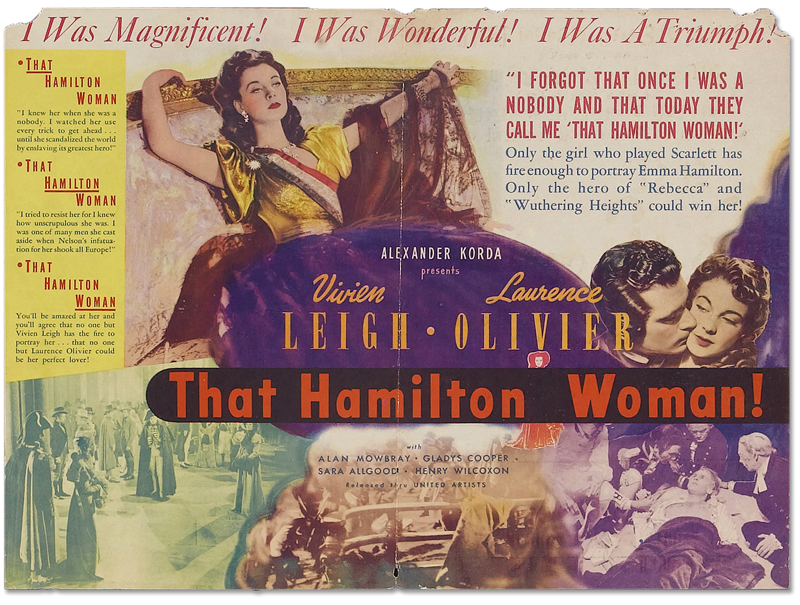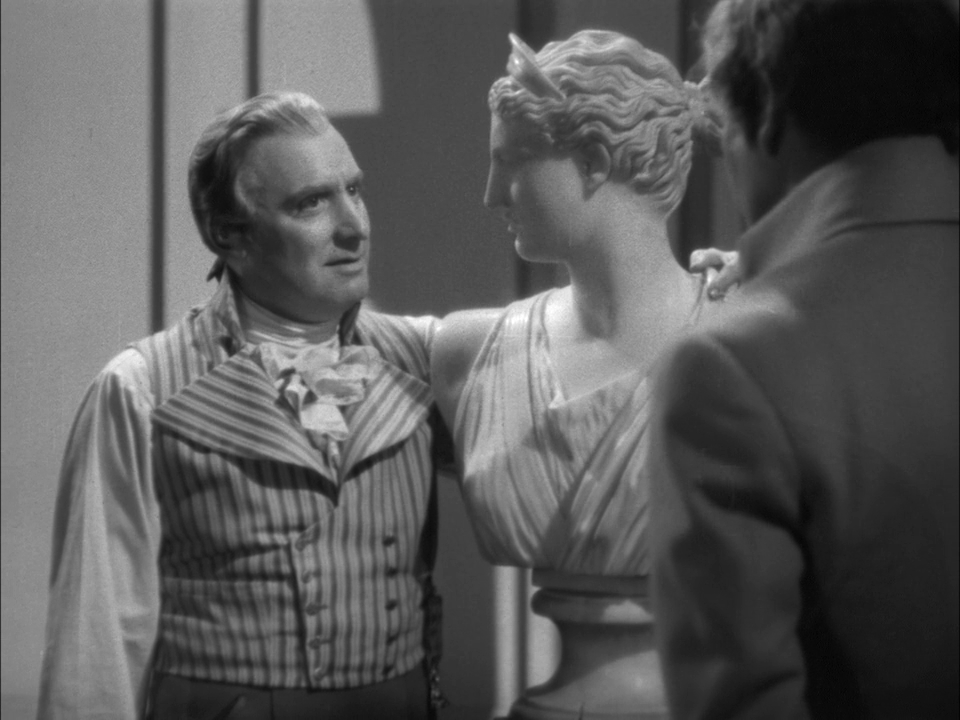The Furniture: That Hamilton Woman's High Ceilings
 Monday, May 2, 2016 at 11:00AM
Monday, May 2, 2016 at 11:00AM It's another episode of "The Furniture," Daniel Walber's new series

75 years ago, the United Kingdom was standing nearly alone against the growing might of Nazi Germany. It remained unclear whether the United States would enter the war. And so, from within Hollywood, Alexander Korda set out to help sway American public opinion toward the Union Jack.
That Hamilton Woman was released on April 30th, 1941. Its propagandistic portrayal of Lord Horatio Nelson and his victory over Napoleon’s navy nearly got Korda into very real legal trouble as a foreign agent. His appearance before the Senate Foreign Relations Committee was scheduled for December 12th, but the attack on Pearl Harbor saved the director’s skin. Three quarters of a century later, its reputation rests not on its patriotism, but on its lush melodrama. It continues to enchant as a ravishing portrait of adulterous romance, art imitating the lives of stars Laurence Olivier and Vivien Leigh. He’s Nelson, she the titular Emma, Lady Hamilton who stole his heart and paid the price. [More...]
They met in Naples, where she was the wife of the English ambassador, Lord Hamilton (Alan Mowbray). She had been having an affair with Hamilton’s nephew back in London, but the proprietary uncle ordered the youth to save his reputation and send Emma to Italy, where he would take her in. He tells her quite up front that he wants her as an object of beauty in his house, alongside his collection of beautiful statues recently dug up from Pompeii.
He also fills the house with paintings of his young wife, Hollywood replicas of portraits that George Romney made of the real Emma before her departure from London. The only difference, of course, is the imposition of Leigh's face.

Yet despite this possessive condescension, he lets Emma live a very free life. He even presents her to the court of Naples, something he initially told her would be impossible, given her history. His enormous personal palace, the invention of production designer Vincent Korda (brother to Alexander) and set decorator Julia Heron (Spartacus), is an open paradise of bright halls and spacious rooms from which Emma can rule Neapolitan society.
As an example, take a look at her bedroom. The following images show her towering curtains and the long process with which they must be opened, revealing a breathtaking view of a matte painting of Vesuvius.




The point is not just the obvious luxury, but the fact that Emma is free to reign amid the opulence. She overcomes her husband's possessive misogyny by simply ignoring it, forging an influential friendship with the Queen of Naples that allows her to act on Lord Nelson’s behalf when he arrives. Emma singlehandedly arranges for Neapolitan resources to support the British fleet and assure their victories over the French.
These spaces of immense air and light must seem like paradise to Nelson. Unhappily married, trailed everywhere by a teenage stepchild he clearly dislikes, the Admiral spends all of his time in the cramped quarters of his ship. Cinematographer Rudolph Maté (The Passion of Joan of Arc, Stella Dallas) often leaves some of Korda’s narrow set at the top of the frame, furthering this sense of claustrophobia.

After his colossal defeat of Napoleon in Egypt, he returns to Naples for a grand celebration. Weak, he collapses and ends up in Emma's bed. Surrounded by all of this glamorous freedom, the spell of romance becomes irreversible. Even the grandest battleship is a cage compared to the impossible height of her ceilings.

Of course, history and the Hays Code madue sure that reality set in eventually. The second half of the film is replete with cramped spaces, the darkened houses of repressed England and the dank corners of Nelson’s floating tomb at Trafalgar. But that’s depressing. Instead, I’ll leave you with one more volcano, fuming off to the left as Emma rushes onto her vast balcony to bid farewell to her beloved.





Reader Comments (6)
This is such a treasure of a movie. It will help everyone remember that black and white photography could stand on its own.
Besides the use of space and the lush sets, I particularly recall the use of shadows across the faces of the actors. Vivien Leigh is a marvel to watch. Shame on you if you have not seen this excellent British film.
I had forgotten the production design of this movie, when I watched it I only had eyes for Vivien Leigh. Thanks for reminding me of that lush black and white cinematography and those gorgeous sets.
ladyedith -i'm the same with this movie. I only remember Vivien's face so should probably watch it again
Leigh shld've gotten a nom for this! 1941 is not a particularly strong year.
She's so beautiful & bewitching in here, it made her eventual downfall so sorrowful
Leslie19, you're right, the use of shadows in the film is incredible. There's a shot I really should have included of Olivier in bed, in which the light casts a shadow of his profile onto the pillow next to him. It's amazing. Rudolph Maté was a genius with a really crazy resume.
"The Beauty comes, and had I tongues of fire,
So many songs did Beauty e'er inspire,
Who sees her, of his wits is dispossessed,
And who possessed her was too highly blessed..."